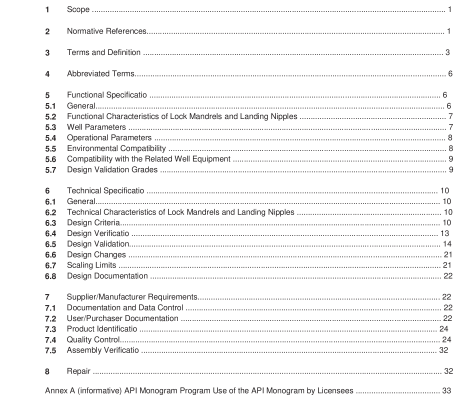API Spec 14L:2020 pdf free download.Lock Mandrels and Landing Nipples
6.3.1.2 Lock mandrel and landing nipple equipment shall be manufactured to drawings and specifications that are substantially the same as those used to manufacture the lock mandrel and landing nipple that has passed the validation test.
6.3.1.3 Design Controls
6.3.1.3.1 The supplier/manufacturer shall establish verified internal yield pressure, collapse pressure and minimum tensile strength, temperature limits, and rated working pressure, excluding end connections. The supplier/manufacturer shall identify the type 1 components of the product and the mode of stress. The supplier/ manufacturer shall calculate the stress level in the type 1 component(s) based upon the maximum loads in the design input requirements to determine those components that are critically stressed. The design shall take into account the effects of pressure containment and pressure-induced loads. Specialized conditions, such as pressure testing with temporary test plugs, shall also be considered.
6.3.1.3.2 Critically stressed components are those type 1 components that are stressed to 90 % or greater of the minimum design yield strength of the material.
6.3.1.3.3 The minimum material condition and minimum material yield strength shall be used in the calculations, which shall include effects of temperature. Metal mechanical properties derating shall be verified by a qualified person and in accordance with: industry recognized published data; data established by the upplier/manufacturer; or data provided by the material subsupplier.
NOTE materials. ASME BPVC Section II, Part D and API TR 6MET contain temperature derated tensile strengths for many
6.3.1.4 Component and subassembly identification and interchangeability shall be required within each supplier’s/manufacturer’s size, type, and model, including working pressure rating of lock mandrel and landing nipple equipment. Additive dimensional tolerances of components shall be such that proper operation of the lock mandrel and landing nipple equipment is verified. This requirement applies to supplier/manufacturer-assembled equipment and to replacement components or subassemblies.
6.3.2 Materials
6.3.2.1 General
The supplier/manufacturer shall have documented specifications for all materials used. If the user/purchaser does not specify materials, the supplier/manufacturer shall select materials suitable for the functional specification. Common hardware items such as nuts, bolts, set screws, and spacers can be specified by reference to industry standards or description.
NOTE See 7.4.4 for traceability requirements. Material substitution, during equipment manufacture, is a temporary change to a BOM for a validated item. Material substitution shall not decrease the performance capabilities of the product and requires approval by a qualified person from the supplier/manufacturer. Sealing device materials shall not be substituted during manufacture.
The manufacturer’s technical justification for each substitution shall be documented and the substituted material shall conform to the design, functional, and technical requirements of this specification. In cases where the user/purchaser specifies material(s) of construction, deviations from such material(s) shall also require user/purchaser approval.
6.3.2.2.2 The mechanical properties specified in 6.3.2.2.1 shall be verified by tests conducted on a representative material sample produced from the same heat, size, and heat treat lot of material. Mechanical testing shall be performed per 7.4.2.2.1 after all thermo-mechanical processing, with the exception of stress relief. Mechanical testing is not required after stress-relieving, provided the stress relief is performed in accordance with the manufacturer’s written requirements designed to ensure the material retains sufficien strength to meet design requirements. Material subsequently stress-relieved shall be hardness tested after processing to confirm compliance with the hardness requirements of the supplier’s/manufacturer’s specifications
6.3.2.2.3 Each welded component shall be stress-relieved in accordance with the supplier’s/manufacturer’s written specifications and, where applicable, in accordance with the ASME Boiler and Pressure Vessel Code, Section IX.
6.3.2.3 Non-metals The supplier/manufacturer shall have documented procedures, including acceptance criteria, for evaluations or testing of sealing materials or other non-metals, to the limits for which the equipment is rated. Evaluations (or tests) shall verify the material used is suitable for use in the specific configuration, environment, and application. These evaluations shall include the combination of pressure, temperature, and the fluids compatible with the intended application.API Spec 14L pdf download.API Spec 14L:2020 pdf free download
